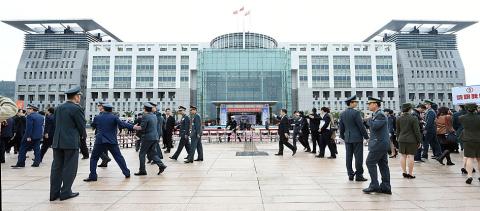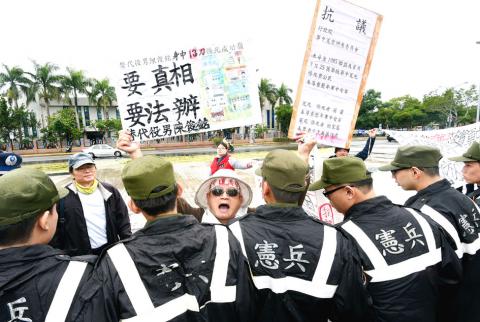The new Ministry of National Defense headquarters complex was officially opened yesterday in Taipei’s Dazhi area (大直), touted by senior military figures and government officials as having state-of-the-art security installations and adopting a “green building concept.”
The main building consists of eight floors, along with several annex buildings. Construction started in 1996, and has taken 18 years to complete, as the project was delayed due to several problems and legal wrangling.
In his address, Minister of National Defense Yen Ming (嚴明), who presided over the opening ceremony yesterday, said the complex represents “a new milestone,” and from now on the Dazhi area with the relocated ministry and armed forces headquarters has become the “new Boai Military District” (博愛營區).

Photo: Chang Chia-ming, Taipei Times
Ministry of National Defense Armaments Bureau section head Huang Te-hsiao (黃德孝) said the new complex incorporates “green building concepts” with environmentally friendly, energy-saving designs.
“The new buildings have rainwater harvesting facilities. Up to 1,000 tonnes of rainwater can be stored on site. There are also wastewater treatment and filtering systems,” said Huang, whose section was in charge of constructing the water system.
He added that by using aluminum and other materials in the exterior glass-wall design, “we are able to reduce thermal heating from direct sunlight by blocking out most infrared and low-frequency radiation.”

Photo: Chang Chia-ming, Taipei Times
Huang also praised the state-of-the-art security system and safety measures of the new complex, calling them “more advanced and powerful than those of the Pentagon,” without elaborating.
He said all personnel and vehicles entering and exiting the ministry buildings must go through security checkpoints, at which their identification cards are verified against photographs and a biometric identification system.
“Each individual and vehicle must have a file on the security database. The digital informatics system can verify their identity within seconds,” Huang said. “On high-security floors, individuals are checked with fingerprint and eye scanners.”
After numerous delays to the project, some legislators and public officials were severely critical of budget overruns, which ballooned to NT$15.8 billion (US$497.65 million).
Although President Ma Ying-jeou (馬英九) was invited to the opening ceremony, he did not attend.
According to media reports, Ma did not attend because votes by military personnel and their dependents failed to materialize for the Chinese Nationalist Party’s (KMT) candidates in last month’s nine-in-one elections.
Meanwhile, family members of several soldiers who died during their service in the military protested outside the new compound, demanding more transparency in investigations into physical abuse in the military.
Carrying portraits of deceased soldiers, protesting parents and their supporters decried what they said was the military’s disregard for human rights.
The protest was led by the parents of four soldiers who died while serving, which included conscripts for mandatory service, as well as voluntary servicemen.
Members of the Taiwan National Party also showed their support.
Yu Jui-ming (尤瑞敏), the mother of Tsai Hsueh-liang (蔡學良), an air force staff sergeant who died during target practice in 2008, said the military has not revealed the truth.
While military investigators said that Tsai committed suicide, Yu said their report contradicts case evidence.
She staged a hunger strike in May, urging a ballistics test.
“Taiwan is not at war right now; nobody’s son should die in the military,” Yu said. “I do not understand how the ministry has the nerve to spend so much taxpayer money on this new ‘palace.’”
“Each death is like a brick. When you stack them up together, they will be much stronger than the walls of this compound,” Lin Ming-i’s (林明逸) father said, adding that his son died from military hospital malpractice in 2002.
Parents of dead soldiers are demanding answers, Lin’s father said.
“It is very difficult for the parents, but we will no longer sulk in the shadows. More are joining our search for the truth,” he added.
Family members of army sergeant Lien Chih-wei (連志偉) and substitute civilian serviceman Chen Chun-ming (陳俊銘), who passed away in 2005 and 2012 respectively, also attended the protest.
Ministry statistics last year showed that 2,088 men and women died in service between 2000 and 2012, although parents say the number is much higher.

SECURITY: As China is ‘reshaping’ Hong Kong’s population, Taiwan must raise the eligibility threshold for applications from Hong Kongers, Chiu Chui-cheng said When Hong Kong and Macau citizens apply for residency in Taiwan, it would be under a new category that includes a “national security observation period,” Mainland Affairs Council (MAC) Minister Chiu Chui-cheng (邱垂正) said yesterday. President William Lai (賴清德) on March 13 announced 17 strategies to counter China’s aggression toward Taiwan, including incorporating national security considerations into the review process for residency applications from Hong Kong and Macau citizens. The situation in Hong Kong is constantly changing, Chiu said to media yesterday on the sidelines of the Taipei Technology Run hosted by the Taipei Neihu Technology Park Development Association. With

CARROT AND STICK: While unrelenting in its military threats, China attracted nearly 40,000 Taiwanese to over 400 business events last year Nearly 40,000 Taiwanese last year joined industry events in China, such as conferences and trade fairs, supported by the Chinese government, a study showed yesterday, as Beijing ramps up a charm offensive toward Taipei alongside military pressure. China has long taken a carrot-and-stick approach to Taiwan, threatening it with the prospect of military action while reaching out to those it believes are amenable to Beijing’s point of view. Taiwanese security officials are wary of what they see as Beijing’s influence campaigns to sway public opinion after Taipei and Beijing gradually resumed travel links halted by the COVID-19 pandemic, but the scale of

A US Marine Corps regiment equipped with Naval Strike Missiles (NSM) is set to participate in the upcoming Balikatan 25 exercise in the Luzon Strait, marking the system’s first-ever deployment in the Philippines. US and Philippine officials have separately confirmed that the Navy Marine Expeditionary Ship Interdiction System (NMESIS) — the mobile launch platform for the Naval Strike Missile — would take part in the joint exercise. The missiles are being deployed to “a strategic first island chain chokepoint” in the waters between Taiwan proper and the Philippines, US-based Naval News reported. “The Luzon Strait and Bashi Channel represent a critical access

Pope Francis is be laid to rest on Saturday after lying in state for three days in St Peter’s Basilica, where the faithful are expected to flock to pay their respects to history’s first Latin American pontiff. The cardinals met yesterday in the Vatican’s synod hall to chart the next steps before a conclave begins to choose Francis’ successor, as condolences poured in from around the world. According to current norms, the conclave must begin between May 5 and 10. The cardinals set the funeral for Saturday at 10am in St Peter’s Square, to be celebrated by the dean of the College